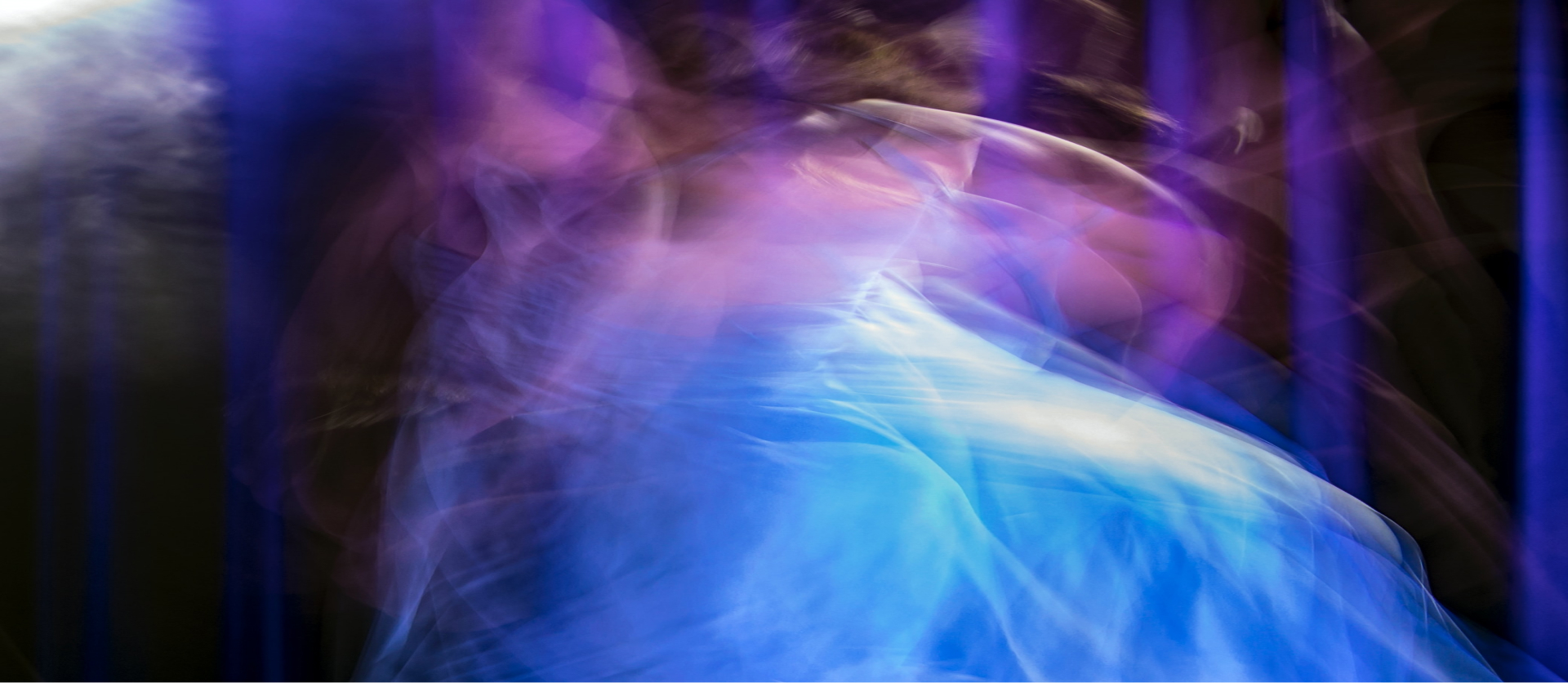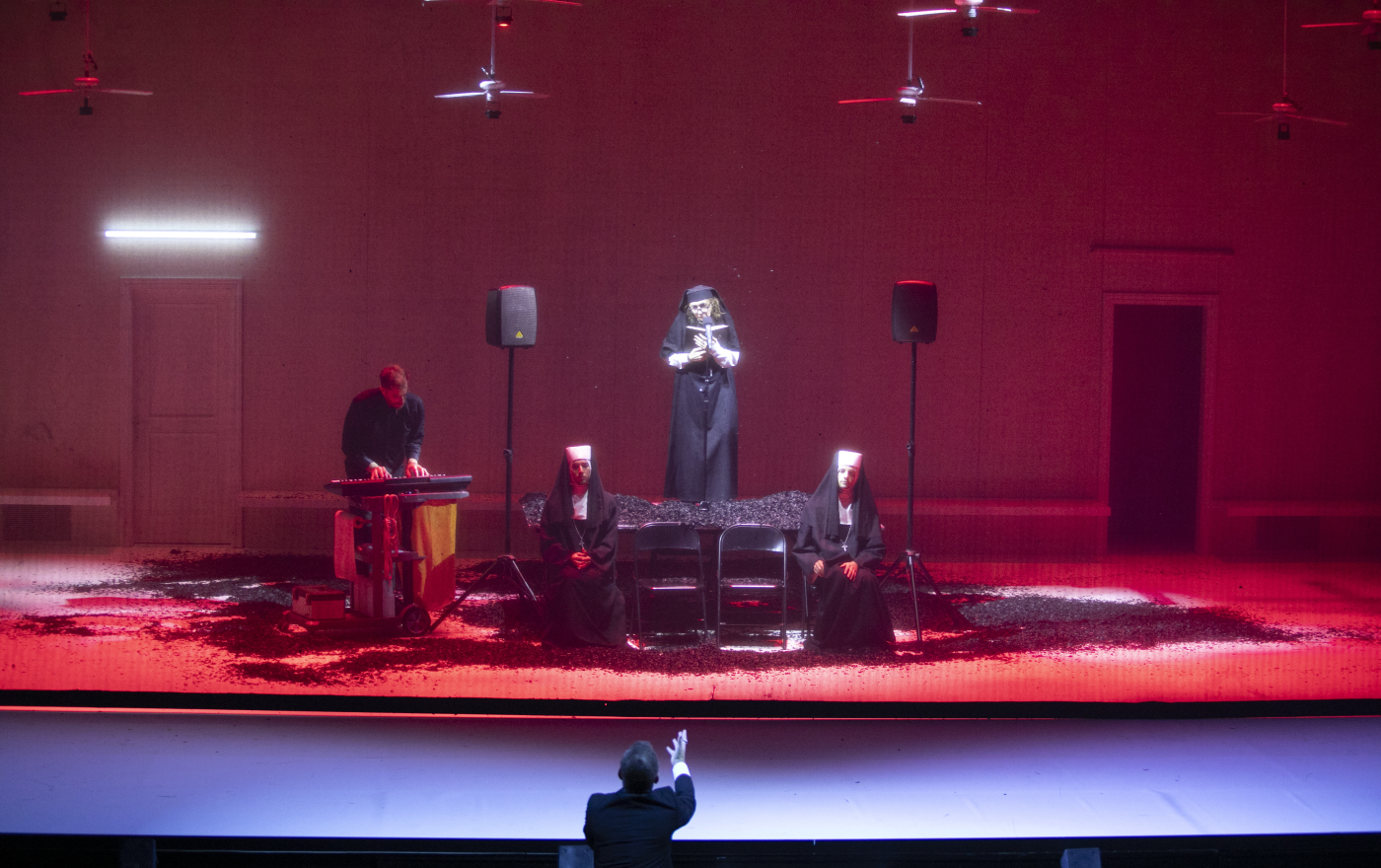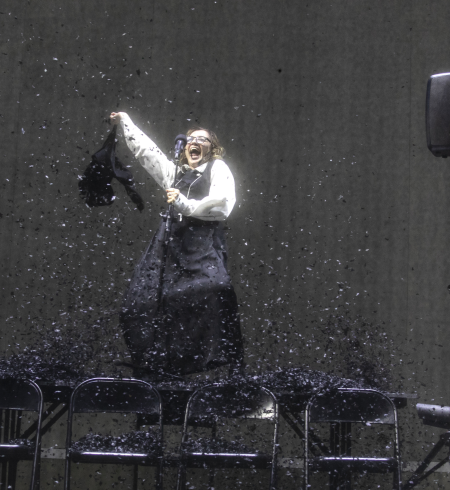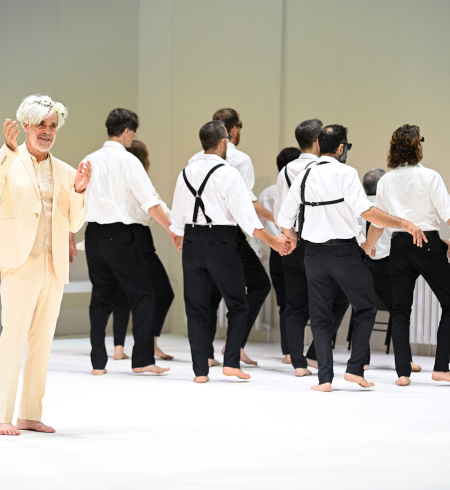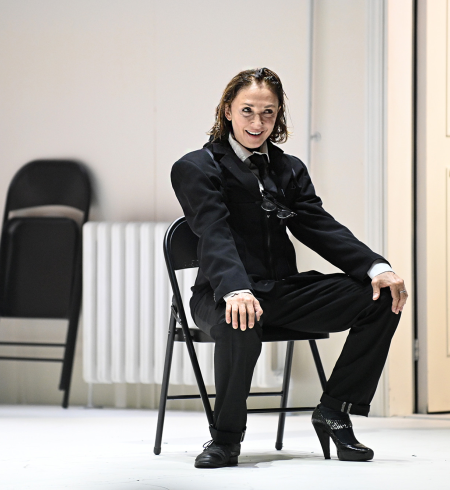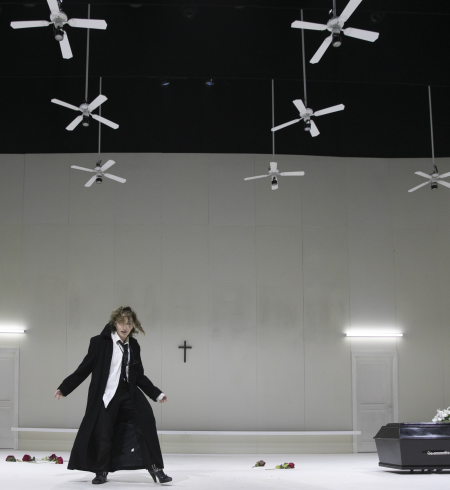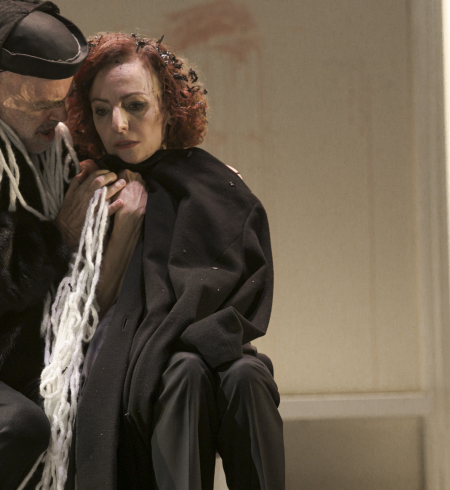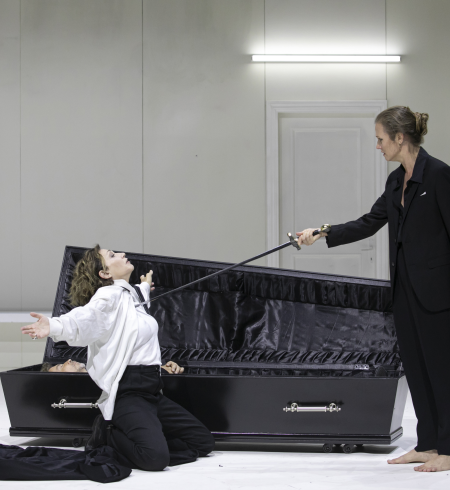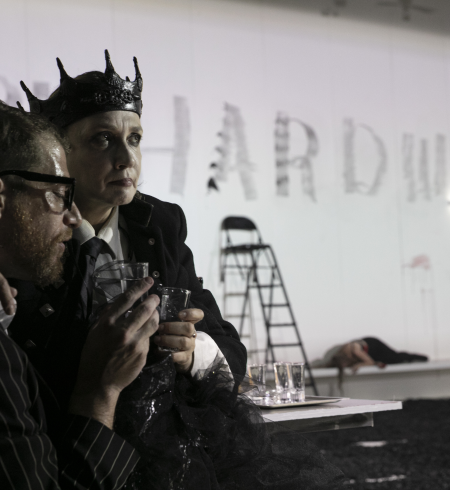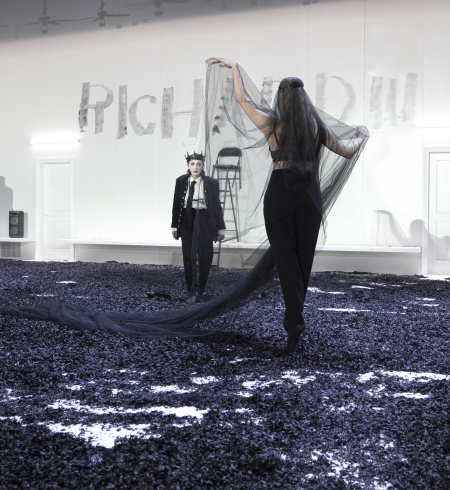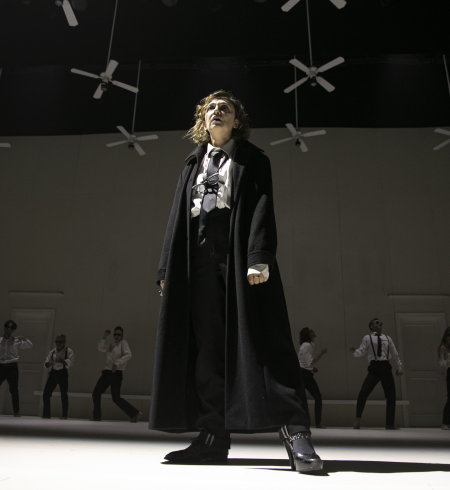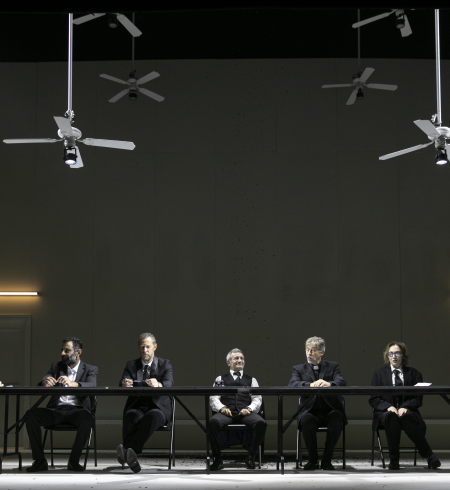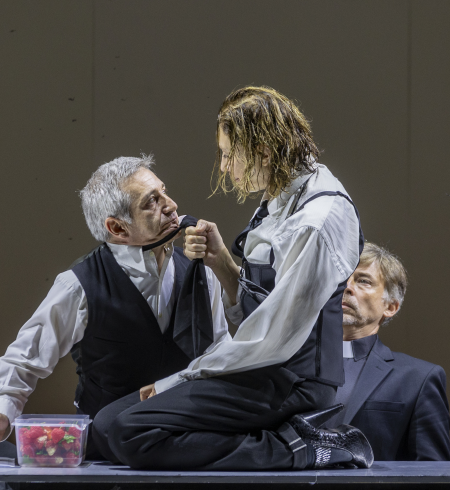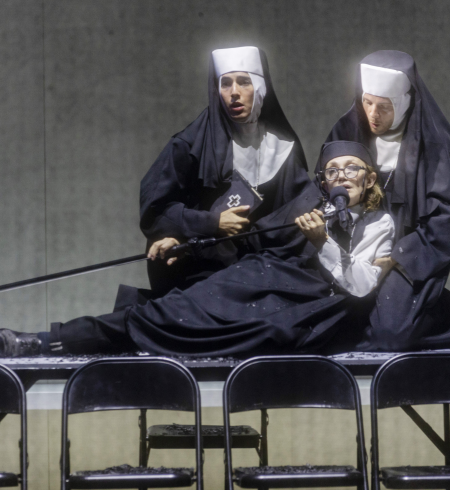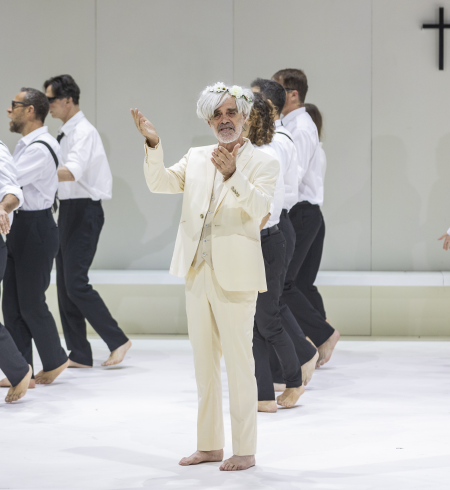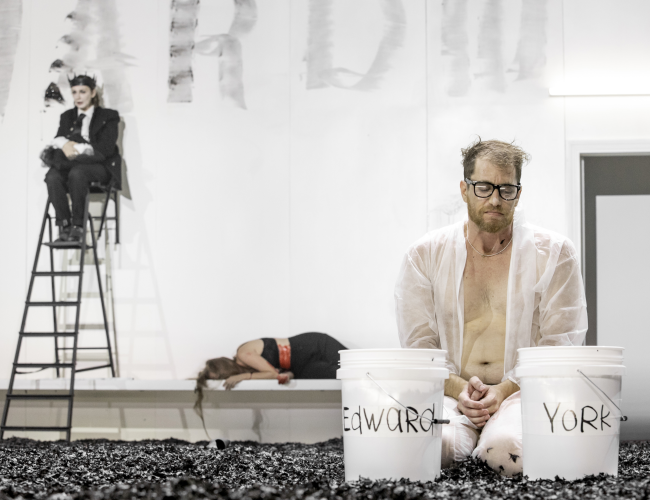
Richard III
- Director: Itay Tiran
- Theatre:GESHER THEATRE , TEL - AVIV
- Hosting Theatre :Griboedov Theater
- Date:
- 21 September - 20:00 hr,
William Shakespeare
Directed by: Itay Tiran
With Evgenia Dodina as King Richard
Translation and soundtrack Dori Parnes
Set design Eran Atzmon
Costume design Judith Aharon
Light design Gleb Filshtinsky
Movement Renana Raz
Sound Michael Vaisburd
Musical production Amit Poznansky
Video Victor Sorokin
Assistant director Yoav Dagan
Duration ; 2 hours 50 minutes with intermission.
After the performance of “Richard III”, the audience will have the opportunity to meet the creative team.
The meeting will be held in English with moderation and translation into Georgian Q&A
Duration | 40 minutes
Why, I can smile and murder whiles I smile.
And cry “content” to that which grieves my heart.
And wet my cheeks with artificial tears.
And frame my face for all occasions.
"Every unhappy family is unhappy in its own way," Tolstoy wrote. "Richard III" is the story of such a family.
The royal offspring, raised in a family strife, a rejected, sickly, and fierce child turns into a malignant tumor that devours everything around him.
This family drama becomes a national tragedy in the play where the personal is inseparable from the political.
Centuries before Netflix, Shakespeare created the first serial killer. A magnificent freak, an eloquent and moving clown rapist who takes us on a thrilling journey of destruction. The wounded villain, who steps on corpses all the way to the throne, is a warning to all, a reflection of the terrible danger where the destruction of the family is followed by the destruction of the state.
CAST
Richard, Duke of Gloucester, later King Richard III Evgenia Dodina
King Edward IV, brother to Richard / Duchess of York, mother of Richard,
Edward, and Clarence Doron Tavori
George, Duke of Clarence, brother to Edward and Richard /
Lord Stanley Israel (Sasha) Demidov
Duke of Buckingham Gilad Kletter
Queen Elizabeth, Edward’s wife Michal Weinberg
Lady Anne, widow o f Edward, son to the late King Henry VI;
later wife to Richard Lena Fraifeld
Lord Hastings / Lord Mayor of London Alexander Senderovich
Sir William Catesby Paulo E. Moura
Sir Robert Brakenbury, Lieutenant of the Tower in London Eli Menashe
Earl Rivers, brother to Queen Elizabeth / Prince Edward Noam Tal
Lord Grey, son of Queen Elizabeth by her former marriage /
Duke of York (the son) Shir Sayag
Murderer Shlomi Bertonov
The Bishop of Ely Maxim Rosenberg
"Richard III" at Gesher Theater: A Dark Mirror Reflecting Reality
An unforgettable character, a sharp political interpretation, and a stunning stage aesthetic * Evgenia Dodina commands the stage as the wicked English king in a powerful production that blurs the lines between past and present.
Dana Kahan
Gesher Theater continues to establish itself as a sharp, bold, and creative theatrical force with a powerful and unforgettable production of Shakespeare's Richard III.
The production presents a modern, sharp, and charged interpretation of the classic play, aiming its arrows not only at the blood-soaked past, but directly at the heart of contemporary Israeli reality – the social and the political alike.
Richard III, originally, is a portrait of tyranny rising from the ruins of war, a real historical figure from England's past who, in Shakespeare's writings, becomes a symbol of a man willing to erase all moral values in his ruthless pursuit of power. Nowadays, we might call such a figure a psychopath or a serial killer.
Richard's character is built upon distortion – physical, moral, and psychological – a being who lives and feeds off alienation, a sense of not belonging, and an insatiable thirst for control.
Gesher Theater takes this character and places it in a context more relevant than ever – a world where manipulation and political cynicism are part of everyday life, and truth becomes ideologically flexible.
Watching Richard III by William Shakespeare is neither an easy nor effortless experience. The play, grounded in rich and high language, demands continuous focus from the audience and the ability to follow intricate dialogues, nuances, and events as they unfold in an intelligent, layered manner. Nor does it offer any relief when it comes to its difficult themes – murder, cruelty, and moral depravity. Director Itay Tiran infuses every scene with a sense of urgency and tension, heightening the audience's deliberate discomfort.
The current production of Richard III raises an intriguing and important question: can lofty, archaic texts like those of Shakespeare still be performed meaningfully in modern productions?
The play's elevated and complex language may pose a challenge for contemporary audiences, especially when juxtaposed with modern theatrical elements, including minimalist staging, striking visual effects, and actors who deliver the dialogue with rapid pacing that injects a new dynamic into the performance.
The decision to cast a woman in the role of Richard III is not merely an artistic choice, but a powerful statement. Gender alters the lens through which we view the character, on the one hand, it disrupts the expectation of a male model of tyrannical rule; on the other, it exposes the ways in which power, gender, and disability intertwine to create a monster shaped by a repressive world.
Evgenia Dodina's performance is electrifying and hypnotic. She redefines Shakespeare's tragic anti-hero as a kind of theatrical Joker, drawing the audience deep into Richard's twisted psyche while simultaneously evoking both revulsion and admiration.
Her portrayal blends fragility with brutality, personal charm with pure malevolence, sharp cynical humor with slick manipulation, crafting a multidimensional character from whom it is impossible to look away.
One cannot overlook the production's stunning visual aesthetic: Itay Tiran's direction is precise, and the clever use of stage effects deepens the audience's dramatic and emotional experience.
Every element of the set (design: Eran Atzmon) or the light (design: Gleb Filshtinsky) carries symbolic weight: from the ash rain that gradually fills the stage, to the use of video art (Victor Sorokin), to the meticulous play of light and shadow.
One of the most striking moments in the production occurs when Richard finally reaches his coronation. On the white backdrop of the stage, where a cross had been hanging until that point, a black chair is placed in his honor. The chair is suspended at an unreachable height, prompting his corrupt aides to bring out a ladder. This image powerfully conveys what Richard and his kind truly worship: the murderous lust for power, which callously casts aside compassion, morality, and every trace of human value.
The aesthetic choice of black and white is not merely a visual motif, it forms a complete dramatic language that shapes the viewing experience with penetrating precision. The limited color palette creates a theatrical world reminiscent of film noir: bleak, piercing, and seemingly devoid of mercy. On stage, every element – from costumes to lighting – serves this language: the costumes, in shades of grey, black, and white, evoke a chilly uniformity that erases individuality, while simultaneously highlighting every nuance of movement and expression.
Every entrance and exit feel like a tactical maneuver in a battlefield, and the stage itself becomes a kind of living chessboard.
One of the most striking dramatic tools in this production is the integration of classic Israeli songs, a choice that renders the play deeply relevant and critical of current events in Israel.
Tiran does not impose the play as an allegory for Israeli society; rather, he weaves the connection subtly and poignantly, striking a visceral chord.
Gesher's Richard III is more than a powerful production, it is a call for introspection. It is a sharply focused mirror reflecting how governance can develop into a bitter farce, how a society can relinquish its values in the name of false stability, and how – through Shakespeare and Israeli music – we come to realize just how close we are to the trap he portrays.
With its arresting visual aesthetics, electrifying performances, and razor-sharp political insight, the production not only revives Shakespeare's classic, but imbues it with contemporary urgency and biting social critique – on power, politics, and the ways we view reality through a prism of black and white, often ignoring the grey in between.
This is not merely a theatrical experience, it is one that lingers, provoking thought long after the applause had

